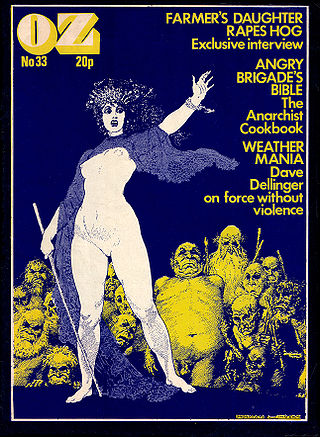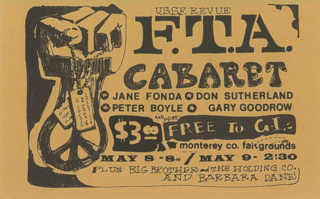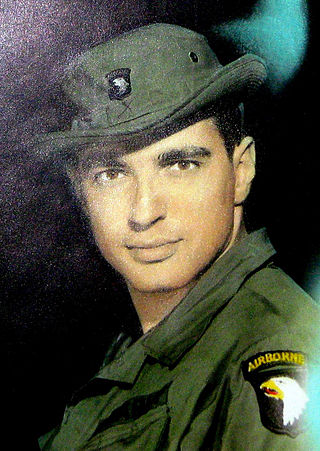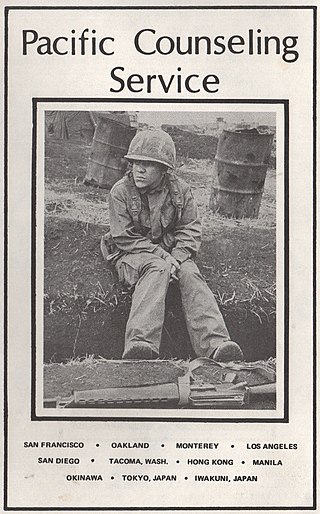Related Research Articles

Garretson Beekman Trudeau is an American cartoonist, best known for creating the Doonesbury comic strip.

Stars and Stripes is a daily American military newspaper reporting on matters concerning the members of the United States Armed Forces and their communities, with an emphasis on those serving outside the United States. It operates from inside the Department of Defense, but is editorially separate from it, and its First Amendment protection is safeguarded by the United States Congress to whom an independent ombudsman, who serves the readers' interests, regularly reports. As well as a website, Stars and Stripes publishes a global daily print edition for U.S. military service members serving overseas Monday through Friday. This global edition is also available as a free download in electronic format. The newspaper has its headquarters in Washington, D.C.

The Viet Cong (VC) was an epithet and umbrella term to refer to the communist-driven armed movement and united front organization in South Vietnam. Formally organized as and led by the National Liberation Front of South Vietnam and nominally conducted military operations under the name of the Liberation Army of South Vietnam (LASV), the movement fought under the direction of North Vietnam against the South Vietnamese and United States governments during the Vietnam War. The organization had both guerrilla and regular army units, as well as a network of cadres who organized and mobilized peasants in the territory the VC controlled. During the war, communist fighters and some anti-war activists claimed that the VC was an insurgency indigenous to the South that represented the legitimate rights of people in South Vietnam, while the U.S. and South Vietnamese governments portrayed the group as a tool of North Vietnam. It was later conceded by the modern Vietnamese communist leadership that the movement was actually under the North Vietnamese political and military leadership, aiming to unify Vietnam under a single banner.
An Amerasian may refer to a person born in East or Southeast Asia to an East Asian or Southeast Asian mother and a U.S. military father. Other terms used include War babies or G.I. babies.

The terms underground press or clandestine press refer to periodicals and publications that are produced without official approval, illegally or against the wishes of a dominant group. In specific recent Asian, American and Western European context, the term "underground press" has most frequently been employed to refer to the independently published and distributed underground papers associated with the counterculture of the late 1960s and early 1970s in India and Bangladesh in Asia, in the United States and Canada in North America, and the United Kingdom and other western nations. It can also refer to the newspapers produced independently in repressive regimes. In German occupied Europe, for example, a thriving underground press operated, usually in association with the Resistance. Other notable examples include the samizdat and bibuła, which operated in the Soviet Union and Poland respectively, during the Cold War.

Lauro "Larry" Zarate Alcala was a well-known editorial cartoonist and illustrator in the Philippines. In 2018, he was posthumously conferred the National Artist for Visual Arts title and the Grand Collar of the Order of National Artists.

The FTA Show, a play on the common troop expression "Fuck The Army", was a 1971 anti-Vietnam War road show for GIs designed as a response to Bob Hope's patriotic and pro-war USO tour. The idea was first conceived by Howard Levy, an ex-US Army doctor who had just been released from 26 months in Fort Leavenworth military prison for refusing orders to train Green Beret medics on their way to the Vietnam War. Levy convinced actress Jane Fonda to participate and she in turn recruited a number of actors, entertainers, musicians and others, including the actors Donald Sutherland, Peter Boyle, Garry Goodrow and Michael Alaimo, comedian and civil rights activist Dick Gregory and soul and R&B singer Swamp Dogg. Alan Myerson, of San Francisco improv comedy group The Committee, agreed to direct, while cartoonist and author Jules Feiffer and playwrights Barbara Garson and Herb Gardner wrote songs and skits for the show. Fred Gardner, the originator of the antiwar GI Coffeehouse movement, became the Tour's "stage manager and liaison to the coffeehouse staffs." At various times other actors, writers, musicians, comedians and entertainers were involved. The United States Servicemen's Fund (USSF), with Dr. Levy as one of its principal organizers, became the official sponsor of the tour. The anti-Vietnam War USSF, promoted free speech within the US military, funded and supported independent GI newspapers and coffeehouses, and worked to defend the legal rights of GIs. Sponsorship was later taken over by a group called the Entertainment Industry for Peace & Justice (EIPJ).

The Battle of Ba Gia was a major battle that marked the beginning of the Viet Cong's (VC) Summer Offensive of 1965, during the early phases of the Vietnam War. The battle took place in Quảng Ngãi Province, South Vietnam, between May 28–31, 1965.
Francisco Flores Trinidad, Jr., better known by his pen name "Corky", was a Filipino-American editorial cartoonist and comics artist. Born in Manila, he was known for his editorial cartoons for the Honolulu Star-Bulletin since 1969, and especially for his Vietnam War comic strip Nguyen Charlie.

Jeff Sharlet (1942–1969), a Vietnam veteran, was a leader of the GI resistance movement during the Vietnam War and the founding editor of Vietnam GI. David Cortright, a major chronicler of the Vietnam GI protest movement wrote, "Vietnam GI, the most influential early paper, surfaced at the end of 1967, distributed to tens of thousands of GIs, many in Vietnam, closed down after the death of founder Jeff Sharlet in June, 1969."
The National Committee for a Citizens Commission of Inquiry on U.S. war crimes in Vietnam was founded in New York by Ralph Schoenman in November 1969 to document American atrocities throughout Indochina. The formation of the organization was prompted by the disclosure of the My Lai Massacre on November 12, 1969, by Seymour Hersh, writing for the New York Times. The group was the first to bring to public attention the testimony of American Vietnam War veterans who had witnessed or participated in atrocities.

Blondie is an American sitcom that aired on CBS during the 1968–69 television season. The series is an updated version of the 1957 TV series based on the comic strip of the same name. The series stars Patricia Harty as the title character and Will Hutchins as her husband, Dagwood Bumstead. Jim Backus played Dagwood's boss Mr. Dithers, with his real-life wife, Henny Backus, playing Cora Dithers. The series also featured Peter Robbins as the Bumsteads' son, Alexander, Pamelyn Ferdin as their daughter, Cookie, and character actor Bryan O'Byrne as the hapless mailman, always getting run over by Dagwood hurrying out the door, late for work.

Military humor is humor based on stereotypes of military life. Military humor portrays a wide range of characters and situations in the armed forces. It comes in a wide array of cultures and tastes, making use of burlesque, cartoons, comic strips, double entendre, exaggeration, jokes, parody, gallows humor, pranks, ridicule and sarcasm.

Leslie Halasz Sabo Jr. was a soldier in the United States Army during the Vietnam War. He received the highest military decoration, the Medal of Honor, for his actions during the Cambodian Campaign in 1970.
The Overseas Weekly was an English-language newspaper published in Frankfurt, Germany, from 1950 to 1975. Its primary audience was American military personnel stationed in Europe, especially enlisted men and especially in Germany, reaching a circulation of about 50,000 copies a week. Sister publications eventually included Overseas Family and Overseas Traveler, as well as a Pacific edition during the height of the Vietnam War. Conflict with the U.S. military establishment was a frequent occurrence.

GI's Against Fascism was a small but formative organization formed within the United States Navy during the years of conscription and the Vietnam War. The group developed in mid-1969 out of a number of sailors requesting adequate quarters, but coalesced into a formal organization with a wider agenda: a more generalized opposition to the war and to perceived institutional racism within the U.S. Navy. Although there had been earlier antiwar and GI resistance groups within the U.S. Army during the Vietnam era, GI's Against Fascism was the first such group in the U.S. Navy. The group published an underground newspaper called Duck Power as a means of spreading its views.

GI coffeehouses were coffeehouses set up as part of the anti-war movement during the Vietnam War era as a method of fostering antiwar and anti-military sentiment within the U.S. military. They were mainly organized by civilian antiwar activists, though many GIs participated in establishing them as well. They were created in numerous cities and towns near U.S. military bases throughout the U.S as well as Germany and Japan. Due to the normal high turnover rate of GIs at military bases plus the military's response which often involved transfer, discharge and demotion, not to mention the hostility of the pro-military towns where many coffeehouses were located, most of them were short-lived, but a few survived for several years and "contributed to some of the GI movement's most significant actions". The first GI coffeehouse of the Vietnam era was set up in January 1968 and the last closed in 1974.

Waging Peace in Vietnam: U.S. Soldiers and Veterans Who Opposed the War is a non-fiction book edited by Ron Carver, David Cortright, and Barbara Doherty. It was published in September 2019 by New Village Press and is distributed by New York University Press. In March 2023 a Vietnamese language edition of the book was launched at the War Remnants Museum in Ho Chi Minh City, Vietnam.

The Pacific Counseling Service (PCS) was a G.I. counseling service organization created by antiwar activists during the Vietnam War. PCS saw itself as trying to make the U.S. Armed Forces "adhere more closely to regulations concerning conscientious objector discharges and G.I. rights." The Armed Forces Journal, on the other hand, said PCS was involved in "antimilitary activities", including "legal help and incitement to dissident GIs." PCS evolved out of a small GI Help office started by a freshly discharged Air Force Sergeant in San Francisco, California in January 1969. The idea rapidly caught on among antiwar forces and within a year PCS had offices in Monterey, Oakland, and San Diego in California, plus Tacoma, Washington. By 1971 it had spread around the Pacific with additional offices in Los Angeles, Hong Kong, Okinawa, the Philippines, as well as Tokyo and Iwakuni in Japan. Each location was established near a major U.S. military base. At its peak, PCS was counseling hundreds of disgruntled soldiers a week, helping many with legal advice, conscientious objector discharges and more. As the war wound down, ending in 1975, the offices closed with the last office in San Francisco printing its final underground newspaper in 1976.
References
- ↑ "170th AHC - Nguyen Charlie". www.170th.com.